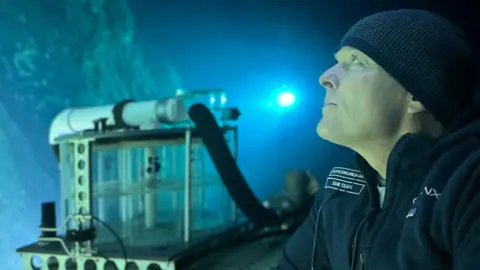David Lochridge, a prominent whistleblower in the unfolding tragedy surrounding Oceangate’s Titan, has voiced his frustrations and concerns about the tragic fate of the submersible that imploded during its attempt to explore the Titanic wreck in June 2023. Lochridge, who served as the Director of Marine Operations at Oceangate, expressed his initial hopes for the survival of the five individuals aboard, including Oceangate’s CEO Stockton Rush. His warnings about the safety issues that led to the disaster, however, fell on deaf ears and led to his dismissal in 2018.
Lochridge’s story illuminates critical failures in safety, testing, and maintenance at Oceangate. He strongly believed that a serious incident was imminent due to the company’s negligence regarding equipment quality. Tragically, his fears culminated in what the U.S. Coast Guard (USCG) later described as a preventable disaster, pointing to the design and operational oversights that ultimately contributed to the tragedy.
In the aftermath of the incident, Lochridge remarked, “people were sold a lie,” referring to the assurances given about the safety of the Titan and the operational standards that were ultimately not met. His commentary reflects deep-seated frustrations with both Oceangate’s practices and the failure of regulatory agencies to safeguard public welfare. While Oceangate continued its excursions to the Titanic, Lochridge’s warnings cast a shadow over these undertakings, emphasizing that better oversight could have potentially averted the calamity.
### Background on David Lochridge
Colloquially known as a straight-shooter, Lochridge moved to the U.S. from Scotland in 2011, full of enthusiasm for the innovative project Oceangate was pursuing. The prospect of creating a submersible capable of taking paying passengers to the Titanic wreck was groundbreaking, and Lochridge was deeply invested in the mission. However, his extensive experience—including a background in the Royal Navy and submarine rescue operations—left him acutely aware of the risks associated with deep-sea exploration.
From the onset, Lochridge was tasked with ensuring safety for the crew and passengers on board Titan. As the project progressed, however, he began to notice troubling discrepancies in the implementation of safety protocols, particularly after Oceangate opted to construct the hull out of carbon fiber—an unprecedented and untested material for such deep dives. He advocated fervently for an independent safety assessment that was regrettably ignored by the leadership.
### Safety Concerns and Whistleblower Retaliation
As construction of the Titan advanced, Lochridge observed multiple defects in the carbon fiber hull and issues with other critical components, such as poorly machined titanium domes. His relentless scrutiny and transparency about these problems soon led to confrontation with senior executives at Oceangate, particularly with Stockton Rush who appeared unyielding to Lochridge’s concerns.
In January 2018, Lochridge formally articulated his fears regarding Titan’s safety in a comprehensive report, urging a postponement of commercial dives. The fallout from presenting these concerns was immediate and severe—he was summarily dismissed, prompting Lochridge to approach the Occupational Safety and Health Administration (OSHA) for recourse. His whistleblower complaint, however, was met with bureaucratic delays and frustrations that left him feeling vulnerable and abandoned.
Initially, OSHA highlighted the urgent nature of Lochridge’s complaint, assuring him of protection under whistleblower laws. Yet subsequent actions taken by Oceangate saw them retaliate against him, attempting to coerce him to abandon his complaint. When the situation escalated to litigation, Lochridge countersued for wrongful termination. Ultimately, under immense stress from the company’s legal machinations, he was forced to withdraw his claims.
### Reflection on Tragedy and Regulation
The Titan’s disappearance and subsequent recovery of wreckage on the ocean floor brought Lochridge’s concerns into stark focus. During the USCG public hearings, he criticized the lack of effective measures to investigate his warnings adequately. He believes that had his safety concerns been addressed with the seriousness they warranted, the disaster involving Titan could have been avoided.
In a poignant statement, Lochridge asserted, “It didn’t need to happen. It didn’t – and it should have been stopped.” This reflects not just a sense of personal grievance but a fervent hope that examples like his could pave the way for enforced regulatory changes in marine safety. In light of the tragedy, both OSHA and the USCG have acknowledged systemic failures in addressing whistleblower complaints, asserting a commitment to improve procedures in the future.
As Oceangate has ceased operations pending investigations, Lochridge’s story serves as a stark reminder of the dire consequences that arise from negligence in safety practices, particularly in high-risk environments such as deep-sea exploration.












